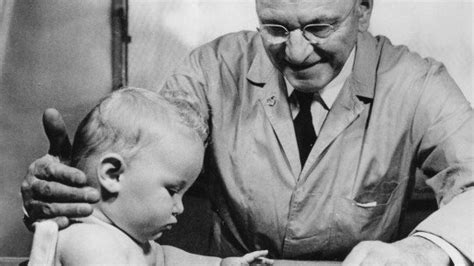A Quote by Maria Montessori
If education recognizes the intrinsic value of the child's personality and provides an environment suited to spiritual growth, we have the revelation of an entirely new child whose astonishing characteristics can eventually contribute to the betterment of the world.
Related Quotes
Music education can help spark a child's imagination or ignite a lifetime of passion. When you provide a child with new worlds to explore and challenges to tackle, the possibilities are endless. Music education should not be a privilege for a lucky few, it should be a part of every child's world of possiblity.
Education spurs growth and unlocks potential. After all, a single year of primary education creates a 10 to 20 percent increase in a woman's wages later in life. Education lowers the risk of disease and decreases the likelihood that a child will fall into violence and crime. And a child born to a literate mother is 50 percent more likely to survive past age five. No country has achieved sustained growth without at least 40 percent literacy for its adults.
Education is identical with helping the child realize his potentialities. The opposite of education is manipulation, which is based on the absence of faith in the growth of potentialities and the connection that a child will be right only if the adults put into him what is desirable and suppress what seems to be undesirable.
In essence, the stock market represents three separate categories of business. They are, adjusted for inflation, those with shrinking intrinsic value, those with approximately stable intrinsic value, and those with steadily growing intrinsic value. The preference, always, would be to buy a long-term franchise at a substantial discount from growing intrinsic value.
Shallow ecology is anthropocentric, or human-centred. It views humans as above or outside nature, as the source of all value, and ascribes only instrumental, or 'use', value to nature. Deep ecology does not separate humans - or anything else - from the natural environment. It does see the world not as a collection of isolated objects but as a network of phenomena that are fundamentally interconnected and interdependent. Deep ecology recognizes the intrinsic value of all human beings and views humans as just one particular strand in the web of life.
For success in training children the first condition is to become as a child oneself, but this means no assumed childishness, no condescending baby-talk that the child immediately sees through and deeply abhors. What it does mean is to be as entirely and simply taken up with the child as the child himself is absorbed by his life.
...we discovered that education is not something which the teacher does, but that it is a natural process which develops spontaneously in the human being. It is not acquired by listening to words, but in virtue of experiences in which the child acts on his environment. The teacher's task is not to talk, but to prepare and arrange a series of motives for cultural activity in a special environment made for the child.
The essential and defining characteristic of childhood is not the effortless merging of dream and reality, but only alienation. There are no words for childhood's dark turns and exhalations. A wise child recognizes it and submits to the necessary consequences. A child who counts the cost is a child no longer.
Play, Incorporating Animistic and Magical Thinking Is Important Because It:
Fosters the healthy, creative and emotional growth of a child;
Forms the best foundation for later intellectual growth.
Provides a way in which children get to know the world and creates possibilities for different ways of responding to it.
Fosters empathy and wonder.
Ideal for the child and society in the best of times, Rudolf Steiner's brilliant process of education is critically needed and profoundly relevant now at this time of childhood crisis and educational breakdown. Waldorf Education nurtures the intellectual, psychological and spiritual unfolding of the child. The concerned parent and teacher will find a multitude of problems clearly addressed in this practical, artistic approach.
Red RodsBefore elaborating any system of education, we must therefore create a favorable environment that will encourage the flowering of a child's natural gifts. All that is needed is to remove the obstacles. And this should be the basis of, and point of departure for, all future education. The first thing to be done, therefore, is to discover the true nature of a child and then assist him in his normal development.
The child's personality is a product of slow gradual growth. His nervous system matures by stages and natural sequences. He sits before he stands; he babbles before he talks; he fabricates before he tells the truth; he draws a circle before he draws a square; he is selfish before he is altruistic; he is dependent on others before he achieves dependence on self. All of his abilities, including his morals, are subject to laws of growth. The task of child care is not to force him into a predetermined pattern but to guide his growth.
































